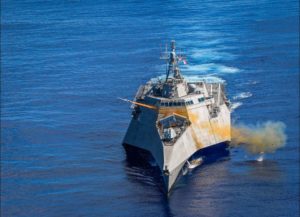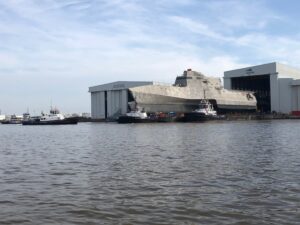Austal USA President Craig Perciavalle resigned amid U.S. and Australian investigations concerning the Littoral Combat Ship (LCS), the company said Tuesday.
Parent company Austal acknowledged separate but related investigations being conduct by the U.S. Department of Justice and Securities Exchange Commission as well as the Australian Securities and Investments Commission focusing on the write back of work in progress (WIP) attributable to the LCS program before July 2016, the procurement of ship components for use in U.S. contracts, and charging and allocation of labor hours.

Gabrielle Giffords (LCS-10) launches a Naval Strike Missile (NSM) during the biennial Pacific Griffin exercise as part of a sinking exercise on Oct. 1., 2019. (Photo: U.S. Navy)
Austal USA builds the even-numbered Independence-variant LCS at its shipyard in Mobile, Ala. Separately, Lockheed Martin [LMT] is the prime contractor for the odd-numbered Freedom-variant LCS, built by Fincantieri Marinette Marine in Wisconsin.
While under investigation, the company hired external American lawyers to “conduct their own detailed investigation in relation to what they understand to be the focus of the U.S. regulatory investigations.”
After the external investigation concluded, the Austal USA Board accepted the resignation of Perciavalle with current Austal USA Chief Financial Officer (CFO) Rusty Murdaugh appointed as interim president. Murdaugh will remain in that position while the company searches for a new permanent president.
Murdaugh first became Austal USA CFO in 2017 and previously spent three decades in financial management in the defense industry including at United Technologies (now Raytheon Technologies [RTX]), Goodrich, Honeywell [HON], and as vice president of finance of a business segment of Esterline Technologies (since acquired by TransDigm [TDG].
Austal said it and subsidiary Austal USA have been cooperating with the American regulatory authorities in these investigations.
The company said after the external investigation it is satisfied the significance of the write back of WIP in July 2016 “appropriately adjusted Austal’s revenue and profit following the revision that was made to the estimated cost to complete the remaining vessels in the LCS program.”
Austal also said it is satisfied Austal USA “materially complied” with its reporting requirements with the U.S. Navy.

However, the company admitted the LCSs cost more to build than originally planned, largely due to additional costs incurred to meet U.S. Navy vessel rules requirements and mandatory shock standards.
“The Company announced a one-off write back of WIP in July 2016 to fully reflect these additional costs.”
Austal said before 2016 inaccuracies in internally generated cost estimates “understated the full costs to construct the LCS vessels, which delayed Austal Ltd’s understanding of the magnitude of those costs and the need to change those estimates. This overstated the WIP attributable to the LCS program for those periods.”
The company said it identified “isolated instances of misallocation of labor hours between vessels in the early stages of the LCS program, although no material inaccuracies have been identified regarding the total labor hours for the LCS program.”
The company statement also said installation of certain valves on board the USS Gabrielle Giffords (LCS-10) through the USS Cincinnati (LCS-20) “did not meet all of the required military specifications at the time of their procurement.”
The Navy has since agreed to modify the contract for these ships to accept the “as-built condition” on the valves such that they are not required to be replaced.
“Austal has resolved the U.S. Navy’s contractual claims in relation to the installation of these valves and is in discussions with U.S. regulatory authorities regarding these issues,” the company said.
Austal said it is still engaging with U.S. regulatory authorities in their investigations, but “it is not possible at this stage to predict what action (if any) they may take in relation to these matters.”
“However, the Company is confident that the proactive steps it has already implemented to strengthen its internal reporting and compliance practices will be taken into account in determining whether there are any potential consequences arising from matters identified by the investigation, as well as ensuring such circumstances do not happen again,” it added.
Austal argued its relationship with the Defense Department remains strong, pointing out amid these investigations it received a joint investment in the company’s Mobile shipyard worth about $100 million to implement a steel shipbuilding capacity to complement current aluminum shipbuilding facilities.
The company also argued commissioning the external investigation and implementing changes “demonstrate the seriousness with which Austal is taking this issue and its determination to meet and exceed its global risk and compliance responsibilities.”
The changes include expanding internal compliance and governance functions in the United States.
Separately and concurrently, the Navy stopped accepting delivery of the Lockheed Martin Freedom-variant LCSs due to a material defect with the combining gear on those ships until a design fix finishes testing and is installed (Defense Daily, Jan. 22).